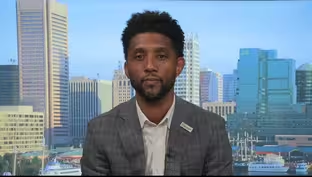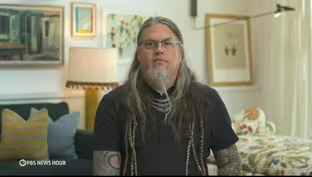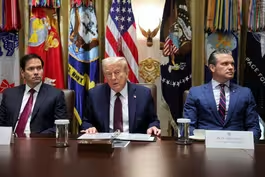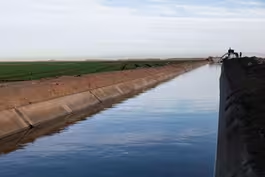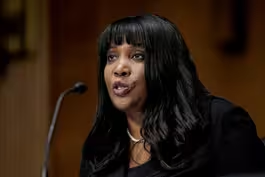
Spotted lanternflies threaten East Coast vineyards
Clip: 8/26/2025 | 4m 46sVideo has Closed Captions
East Coast vineyards threatened by invasive spotted lanternflies
They’re on pavement, in gardens and in parks. If you’re in the Northeast, you’ve probably seen a spotted lanternfly this summer. The invasive species has spread to 19 states where they chow down on dozens of plants, especially grape vines. Deema Zein reports.
Problems playing video? | Closed Captioning Feedback
Problems playing video? | Closed Captioning Feedback
Major corporate funding for the PBS News Hour is provided by BDO, BNSF, Consumer Cellular, American Cruise Lines, and Raymond James. Funding for the PBS NewsHour Weekend is provided by...

Spotted lanternflies threaten East Coast vineyards
Clip: 8/26/2025 | 4m 46sVideo has Closed Captions
They’re on pavement, in gardens and in parks. If you’re in the Northeast, you’ve probably seen a spotted lanternfly this summer. The invasive species has spread to 19 states where they chow down on dozens of plants, especially grape vines. Deema Zein reports.
Problems playing video? | Closed Captioning Feedback
How to Watch PBS News Hour
PBS News Hour is available to stream on pbs.org and the free PBS App, available on iPhone, Apple TV, Android TV, Android smartphones, Amazon Fire TV, Amazon Fire Tablet, Roku, Samsung Smart TV, and Vizio.
Providing Support for PBS.org
Learn Moreabout PBS online sponsorshipAMNA NAWAZ: They're on pavements, in gardens, and in our local parks.
If you're in the Northeast, you have probably seen a spotted lanternfly this summer.
GEOFF BENNETT: The invasive species has now spread to nineteen states, devouring dozens of plants, most notably grapevines, as correspondent Deema Zein reports.
DEEMA ZEIN: In the foothills of Virginia's Blue Ridge Mountains, Loving Cup Vineyard buzzes with life.
KARL HAMBSCH, Loving Cup Vineyard and Winery: There's just a host of tiny little insects that you would never know were there, but they're constantly working for you.
DEEMA ZEIN: But this year, owner Karl Hambsch says, it's crawling with a new unwelcome visitor.
KARL HAMBSCH: This is a spotted lanternfly adult.
DEEMA ZEIN: The bug doesn't feed on grape leaves or fruit like other invasive species.
KARL HAMBSCH: It sticks a straw into the vine and it sucks the sap from the vine, the energy out of the vine.
So it's like a little vampire.
DEEMA ZEIN: As Virginia's only certified organic vineyard and winery, loving-cup can't spray conventional insecticides to kill the little freeloaders.
So Hambsch has taken a drastic step, removing about 15 to 25 percent of the vineyard's fruit.
KARL HAMBSCH: We removed all the clusters off of these vines to allow them to bank the extra energy just to grow leaves and to prepare themselves for infestation by spotted lanternfly.
DEEMA ZEIN: Young spotted lantern flies feast on more than 70 plant species, but when they mature into adults, they become pickier eaters and mainly focus on two plants, the tree of heaven, another invasive species and grapevines.
KARL HAMBSCH: Every invasive that has come into the vineyard has ultimately been absorbed by nature, but this is one that we might lose the vineyard for.
DEEMA ZEIN: Virginia's wineries are just the latest targets of the spotted lanternfly, which first arrived in the country about a decade ago on a shipment of stone from Asia to Southeastern Pennsylvania.
They hit the Keystone State's wineries hard, says entomologist Doug Pfeiffer.
DOUGLAS PFEIFFER, Professor, Virginia Tech: When it was first introduced before people really knew what it was or how to handle it, there were actually entire blocks of vineyards that were killed by the feeding of spotted lanternfly.
DEEMA ZEIN: These bugs have made a slow, destructive rampage south hitchhiking on trucks, trains and cars.
After arriving here in Virginia in 2018, spotted lanternflies exploded across the region and experts say they're here to say.
DOUGLAS PFEIFFER: So in the near term, near to midterm, we can have high numbers because of the lack of natural enemies to provide natural control.
DEEMA ZEIN: While they're now part of the landscape across much of the Northeast, Virginians are adjusting to the state's new red-and-polka dotted residents.
WOMAN: I have seen them everywhere.
MAN: They make me extremely angry.
They're all over our deck.
We can't even enjoy spending time on the deck as a family.
MAN: They will like randomly fly in my face when I'm walking back from work or something.
It's kind of funny.
DEEMA ZEIN: And some have taken up the call from state and local governments to kill the bugs on sight.
MAN: I heard they're, like, pretty invasive.
So I do kill them.
WOMAN: We squish them.
DEEMA ZEIN: But not without some hesitation.
MAN: They are fellow mortals.
So I do have mixed emotions about it.
DEEMA ZEIN: But does squashing lanternflies actually help?
Bug expert Doug Pfeiffer says, it depends.
DOUGLAS PFEIFFER: In those early stages, in the very beginning, you could possibly slow things down that way.
But once it's in an area, that's really not going to retard the population growth very much.
DEEMA ZEIN: They have been spotted as far south as Atlanta and as far West as Chicago.
And studies show they could eventually make their way to California, home to the nation's largest wine region.
MAN: Good job.
DEEMA ZEIN: But scientists are researching how to enlist other species in the effort to stop the spread.
MAN: Yes.
DEEMA ZEIN: One recent study found that dogs can be trained to sniff out lanternfly eggs.
MAN: Good boy.
DEEMA ZEIN: And another is looking into bringing its natural predators from overseas, two types of parasitic wasps.
Back at Loving Cup Vineyard, Karl Hambsch hopes nature will rebalance soon.
KARL HAMBSCH: Every other invasive that has come through the vineyard seemed really scary at first, and once we learned about it, we understood what we could tolerate.
And also, to a certain extent, nature has adjusted itself to absorb the new invasive.
It takes time.
But once nature gets moving, it can do quite a bit.
DEEMA ZEIN: For now, local wine drinkers are hoping that Mother Nature gets a move on.
For "PBS News Hour," I'm Deema Zein in Northern Virginia.
Baltimore mayor responds to Trump's threats to send troops
Video has Closed Captions
Clip: 8/26/2025 | 7m 14s | Baltimore's mayor calls Trump's threats to send in troops 'political theater' (7m 14s)
A Brief But Spectacular take on the power of connection
Video has Closed Captions
Clip: 8/26/2025 | 2m 54s | A Brief But Spectacular take on the power of connection (2m 54s)
Can Trump reinstate the death penalty in Washington, D.C.?
Video has Closed Captions
Clip: 8/26/2025 | 4m 46s | Can Trump legally reinstate the death penalty in Washington, D.C.? (4m 46s)
Farms pressured to boost efficiency as water supply declines
Video has Closed Captions
Clip: 8/26/2025 | 8m 8s | California farms face pressure to boost efficiency as water supply declines (8m 8s)
News Wrap: Israeli says it targeted Hamas in hospital strike
Video has Closed Captions
Clip: 8/26/2025 | 5m 20s | News Wrap: Israeli says it targeted Hamas camera in Gaza hospital strike (5m 20s)
Retired major general slams Trump's National Guard plans
Video has Closed Captions
Clip: 8/26/2025 | 6m 54s | Retired major general calls Trump's National Guard plans 'unneeded and dangerous' (6m 54s)
Trump's attempt to control Fed board threatens independence
Video has Closed Captions
Clip: 8/26/2025 | 12m 27s | How Trump's attempts to control Federal Reserve board threaten its long-held independence (12m 27s)
Providing Support for PBS.org
Learn Moreabout PBS online sponsorshipSupport for PBS provided by:
Major corporate funding for the PBS News Hour is provided by BDO, BNSF, Consumer Cellular, American Cruise Lines, and Raymond James. Funding for the PBS NewsHour Weekend is provided by...
